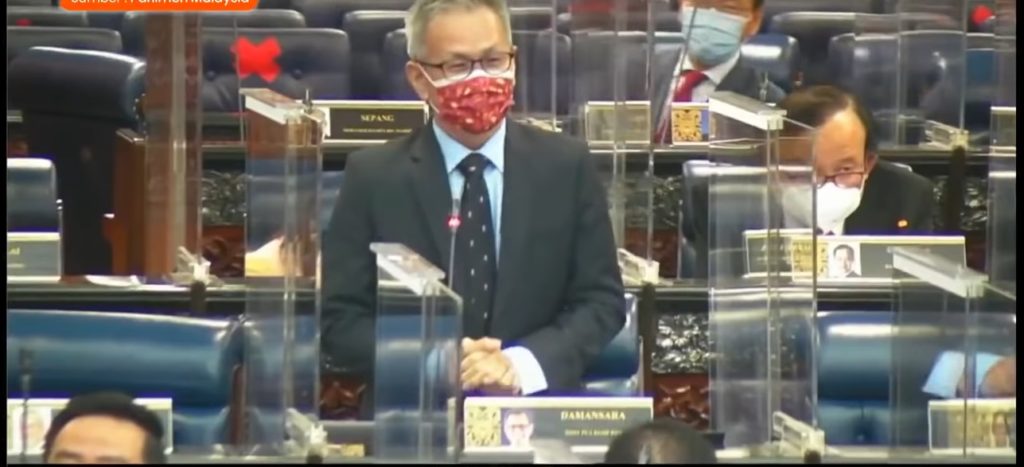The 2022 Budget has had mixed reactions. While the Budget has been hailed a comprehensive budget with inputs taken from various factions, and has taken view of the economic plight of those in the lower income group, and addressed issues affecting businesses and laid out a host of incentives including tax exemptions to revive the economy, there have been also grouses. One is the neglect of the M40 group.
KUALA LUMPUR, Nov 1 – Tax practitioner Peter Xavier, Director of Adiss Consultants commended the fact that the Finance Minister had consultations with various factions including the Opposition prior to the Budget 2022 planning.
“I think that was good and the Budget is comprehensive and covers various areas,” said Xavier,
Commendable

A great deal of efforts have been taken to helping the people, especially those in the B40 and those with families, such as the Bantuan Keluarga Malaysia (BKM) programme, and the allocations given for upskilling and training programmes for Malaysians are commendable.
On the zero rate tax on real property gains, Xavier said that it will be good news for those wishing to sell their properties.
Actually, the zero rated real property gains tax for individuals or non-companies selling properties after six years was there before 2018 which is reintroduced now.
This is good, he said. He cited an example where an individual who sold a property he bought for RM100,000 after more than 20 years for RM2 million. The prevailing tax of 5 percent would have been quite high and might seem quite “unfair”. Now, individuals wishing to sell their property will have to submit all their tax returns form but they do not have to pay any tax on the properties they sell.
Asked on whether this will also boost the property market, he said that while the removal of the tax would encourage the sale of properties by individuals, the property market’s performance would depend on many other factors as well and not tax alone.
Meanwhile, on the tax on foreign income received in Malaysia by Malaysian tax residents, he said it was not new. There used to be a tax upon remittance which was removed during the Asian financial crisis and now it is being reintroduced. There is no clarity on whether it effects both Malaysian Resident Companies and Individuals. This could be anything from business, salary income to rental earned.
“If it affects individuals, this will greatly impact those working in Singapore and are remitting back their income to Malaysia. Authorities have to clarify whether it does affect them and if there is any mechanism in place for either bilateral or unilateral tax credits. If you have suffered tax in Singapore, you should not have to pay again in Malaysia”
“This might make their lives more difficult. As Singapore’s tax rates are much lower than Malaysia, they will be affected as they will be paying tax in Malaysia.”
On the other hand, there is also possibility that those with high investments and earnings overseas, may not bring their money back to Malaysia.
Xavier however said the details are not there but hoped that more details will be out soon such as the period on when the money would be taxed such as income that were made before 2022 or even before that. This would determine if those with huge investment income and so on would bring their money back.
One good thing has been also the extension in tax reliefs especially in the area of health. In the past medical expenses for self, spouse and children included check-up and so on and now extension has been given for mental health claims as well.
The Plight of the M40

Tony Pua, DAP National Publicity Secretary and Member of Parliament for Damansara on Friday said that while the Budget 2022 revived key Pakatan Harapan measures to improve social security and boost employment, it fell short of highlighting any measures or strategies to evade an impending budget crisis in the near future.
“The Minister of Finance must be commended for agreeing to adopt a series of critical measures proposed by Pakatan Harapan (PH), as part of our extensive engagement provided for under the Memorandum of Understanding between the Government and PH.
“Most critically, the Government is allocating RM40 billion under ‘Program Semarak Niaga Keluarga Malaysia’ (SemarakNiaga) to assist business recover from the COVID-19 inflicted economic crisis – covering direct loans, guarantees and equity injection. The fund is intended for all businesses, big and small.
He also noted that PH’s proposal to extend SOCSO protection to self-employed and gig workers had been accepted along with many other proposals and initiatives introduced by PH.
Commending the various schemes announced for the lower wage income, as well as initiatives towards job opportunities, he said the Minister had also extended MySalam scheme to assist the B40 inflicted by critical illness and hospitalisation to include the children of the beneficiaries.
“125,000 patients have benefited from this program introduced by PH to the tune of RM180 million. Unfortunately, our request for the program to be extended to the M40, as promised under PH’s Budget 2020 has once again been ignored.”
Tony Pua said the Budget 2022 nonetheless has failed to address, whether in terms of strategy or measures, an impending budget crisis that is set to befall the Government within the next 3 to 5 years.
“As highlighted in the Budget 2022 Fiscal Outlook, the Medium Term Fiscal Framework 2022-2024 estimated that government revenue will only hit 13.9% of GDP over this period. 1 This is a decline from the expected 14.3% in 2022, cementing a longer term decline from 15.9% (2020) and higher in prior years . In simple terms, in future, the Government will 2 have less funds to spend, invest and influence the economic direction of the country. What then becomes a double whammy on the discretionary spending by the Government is the accelerating increase in fixed payments and charges, as a percentage of total spend.
“These ‘fixed’ expenditures include emoluments, retirement charges (pension), debt service charges, grants and transfers to state governments. For example, emoluments and retirement charges formed 45.5% of Operating Expenditure in 2018 but will increase to 49% in 2022.
“What is more alarming is the massive rise of debt service charges from 13.2% in 2018 to 18.5% in 2022.
“Overall, these ‘fixed’ expenditures increased drastically from 62% of Operating Expenditure in 2018 to 70.9% projected in 2022. This effectively means a major reduction of allocation for ‘Supplies and Services’, ‘Subsidies and Social Assistance’ and other miscellaneous expenses from 38% (2018) to 29.1% (2022), or an enforced 30.5% cut. 3
This ‘squeeze’ arising from the rapidly expanding fixed charges will culminate in a potential fiscal crisis in the medium term, exacerbated by the declining government revenue as a percentage of the GDP. For the past 2 to 3 years, the tightening Operating Expenditure has been ‘eased’ by the Special COVID-19 Fund separately allocated by the Parliament to meet the pandemic crisis.
Much of the “Government’s operating expenditure in the Health sector as well as many grants and subsidies are placed under the COVID-19 Fund. However, as the COVID-19 crisis recedes and the country recovers, the access to such extra-budgetary allocation will soon be limited, or shut altogether. It is now critical for the Ministry of Finance to address how they plan to avert the impending crisis as the measures must be put in place today, and not before it is too late.”
The Questions
Penang Deputy Chief Minister P. Ramasamy said the government had taken the opposition for granted after signing the memorandum of understanding.
He was reported in the local media as saying that he had hoped that with the establishment of various committees and a good working relationship between the government and the opposition, the budget should have reflected the spirit and substance of the MoU.
The ethnic communities that have contributed to the development and well-being of the country are being treated as an appendage to the system, he had said.
“Token recognition in the form of contributions to the vernacular schools and some marginalised ethnic communities are hardly sufficient to address their grievances.
“The fundamental problem is not so much about the budget per se but the political and economic system that directs policies,” Ramasamy said.
He also said the budget was aimed to entrench the power of the incumbent.
–WE